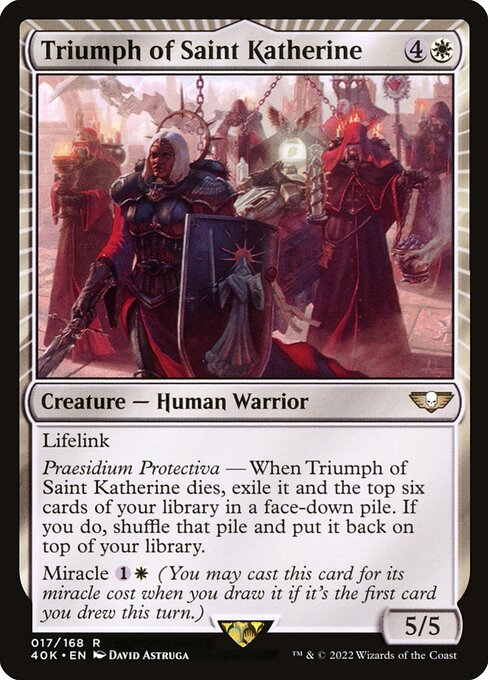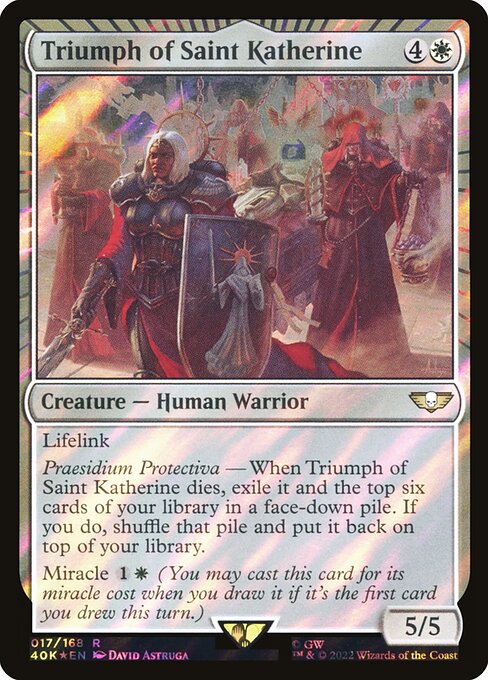Triumph of Saint Katherine
Creature — Human Warrior
Lifelink
Praesidium Protectiva — When Triumph of Saint Katherine dies, exile it and the top six cards of your library in a face-down pile. If you do, shuffle that pile and put it back on top of your library.
Miracle (You may cast this card for its miracle cost when you draw it if it's the first card you drew this turn.)
Praesidium Protectiva — When Triumph of Saint Katherine dies, exile it and the top six cards of your library in a face-down pile. If you do, shuffle that pile and put it back on top of your library.
Miracle (You may cast this card for its miracle cost when you draw it if it's the first card you drew this turn.)
5/5
standard
future
historic
gladiator
pioneer
explorer
modern
legacy
pauper
vintage
penny
commander
brawl
alchemy
paupercommander
duel
oldschool
premodern
Rulings
To determine the total cost of a spell, start with the mana cost or alternative cost (such as a miracle cost) you’re paying, add any cost increases, then apply any cost reductions. The mana value of the spell remains unchanged, no matter what the total cost to cast it was.
You still draw the card, whether you use the miracle ability or not. Any ability that triggers whenever you draw a card, for example, will trigger. If you don’t cast the card using its miracle ability, it will remain in your hand.
You can reveal and cast a card with miracle on any turn, not just your own, if it’s the first card you’ve drawn that turn.
If an effect puts a card into your hand without using the word “draw,” the card wasn’t drawn.
Miracle is an alternative cost to cast the spell with miracle. It can’t be combined with other alternative costs, such as casting a spell “without paying its mana cost.”
It’s important to reveal a card with miracle before it is mixed with the other cards in your hand.
You can cast a card for its miracle cost only as the miracle triggered ability resolves. If you don’t want to cast it at that time (or you can’t cast it, perhaps because there are no legal targets available), you won’t be able to cast it later for the miracle cost.
Multiple card draws are always treated as a sequence of individual card draws. For example, if you haven’t drawn any cards yet during a turn and cast a spell that instructs you to draw three cards, you’ll draw them one at a time. Only the first card drawn this way may be revealed and cast using its miracle ability.
If the card with miracle leaves your hand before the triggered ability resolves, you won’t be able to cast it using its miracle ability.
You cast the card with miracle during the resolution of the triggered ability. Ignore any timing rules based on the card’s type.
When Triumph of Saint Katherine’s first ability resolves, it exiles as many of the relevant cards as possible. If you weren’t able to exile all of those cards, which can happen if you have fewer than six cards in your library or if Triumph of Saint Katherine isn’t in your graveyard as the ability resolves, the exiled cards will not be shuffled and returned to your library. They will remain exiled face-down.
You don’t have to reveal a drawn card with miracle if you don’t wish to cast it at that time.
You still draw the card, whether you use the miracle ability or not. Any ability that triggers whenever you draw a card, for example, will trigger. If you don’t cast the card using its miracle ability, it will remain in your hand.
You can reveal and cast a card with miracle on any turn, not just your own, if it’s the first card you’ve drawn that turn.
If an effect puts a card into your hand without using the word “draw,” the card wasn’t drawn.
Miracle is an alternative cost to cast the spell with miracle. It can’t be combined with other alternative costs, such as casting a spell “without paying its mana cost.”
It’s important to reveal a card with miracle before it is mixed with the other cards in your hand.
You can cast a card for its miracle cost only as the miracle triggered ability resolves. If you don’t want to cast it at that time (or you can’t cast it, perhaps because there are no legal targets available), you won’t be able to cast it later for the miracle cost.
Multiple card draws are always treated as a sequence of individual card draws. For example, if you haven’t drawn any cards yet during a turn and cast a spell that instructs you to draw three cards, you’ll draw them one at a time. Only the first card drawn this way may be revealed and cast using its miracle ability.
If the card with miracle leaves your hand before the triggered ability resolves, you won’t be able to cast it using its miracle ability.
You cast the card with miracle during the resolution of the triggered ability. Ignore any timing rules based on the card’s type.
When Triumph of Saint Katherine’s first ability resolves, it exiles as many of the relevant cards as possible. If you weren’t able to exile all of those cards, which can happen if you have fewer than six cards in your library or if Triumph of Saint Katherine isn’t in your graveyard as the ability resolves, the exiled cards will not be shuffled and returned to your library. They will remain exiled face-down.
You don’t have to reveal a drawn card with miracle if you don’t wish to cast it at that time.
Rulings
To determine the total cost of a spell, start with the mana cost or alternative cost (such as a miracle cost) you’re paying, add any cost increases, then apply any cost reductions. The mana value of the spell remains unchanged, no matter what the total cost to cast it was.
You still draw the card, whether you use the miracle ability or not. Any ability that triggers whenever you draw a card, for example, will trigger. If you don’t cast the card using its miracle ability, it will remain in your hand.
You can reveal and cast a card with miracle on any turn, not just your own, if it’s the first card you’ve drawn that turn.
If an effect puts a card into your hand without using the word “draw,” the card wasn’t drawn.
Miracle is an alternative cost to cast the spell with miracle. It can’t be combined with other alternative costs, such as casting a spell “without paying its mana cost.”
It’s important to reveal a card with miracle before it is mixed with the other cards in your hand.
You can cast a card for its miracle cost only as the miracle triggered ability resolves. If you don’t want to cast it at that time (or you can’t cast it, perhaps because there are no legal targets available), you won’t be able to cast it later for the miracle cost.
Multiple card draws are always treated as a sequence of individual card draws. For example, if you haven’t drawn any cards yet during a turn and cast a spell that instructs you to draw three cards, you’ll draw them one at a time. Only the first card drawn this way may be revealed and cast using its miracle ability.
If the card with miracle leaves your hand before the triggered ability resolves, you won’t be able to cast it using its miracle ability.
You cast the card with miracle during the resolution of the triggered ability. Ignore any timing rules based on the card’s type.
When Triumph of Saint Katherine’s first ability resolves, it exiles as many of the relevant cards as possible. If you weren’t able to exile all of those cards, which can happen if you have fewer than six cards in your library or if Triumph of Saint Katherine isn’t in your graveyard as the ability resolves, the exiled cards will not be shuffled and returned to your library. They will remain exiled face-down.
You don’t have to reveal a drawn card with miracle if you don’t wish to cast it at that time.
You still draw the card, whether you use the miracle ability or not. Any ability that triggers whenever you draw a card, for example, will trigger. If you don’t cast the card using its miracle ability, it will remain in your hand.
You can reveal and cast a card with miracle on any turn, not just your own, if it’s the first card you’ve drawn that turn.
If an effect puts a card into your hand without using the word “draw,” the card wasn’t drawn.
Miracle is an alternative cost to cast the spell with miracle. It can’t be combined with other alternative costs, such as casting a spell “without paying its mana cost.”
It’s important to reveal a card with miracle before it is mixed with the other cards in your hand.
You can cast a card for its miracle cost only as the miracle triggered ability resolves. If you don’t want to cast it at that time (or you can’t cast it, perhaps because there are no legal targets available), you won’t be able to cast it later for the miracle cost.
Multiple card draws are always treated as a sequence of individual card draws. For example, if you haven’t drawn any cards yet during a turn and cast a spell that instructs you to draw three cards, you’ll draw them one at a time. Only the first card drawn this way may be revealed and cast using its miracle ability.
If the card with miracle leaves your hand before the triggered ability resolves, you won’t be able to cast it using its miracle ability.
You cast the card with miracle during the resolution of the triggered ability. Ignore any timing rules based on the card’s type.
When Triumph of Saint Katherine’s first ability resolves, it exiles as many of the relevant cards as possible. If you weren’t able to exile all of those cards, which can happen if you have fewer than six cards in your library or if Triumph of Saint Katherine isn’t in your graveyard as the ability resolves, the exiled cards will not be shuffled and returned to your library. They will remain exiled face-down.
You don’t have to reveal a drawn card with miracle if you don’t wish to cast it at that time.
Your collection? Your decks?
Want to manage your collection and/or create decks?


 0
0
 11.16€
11.16€
